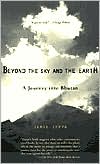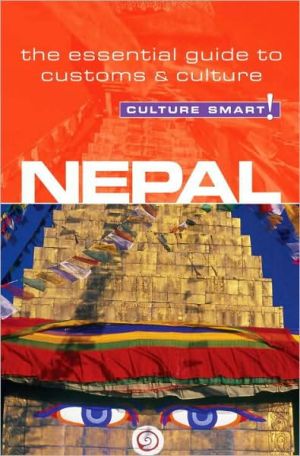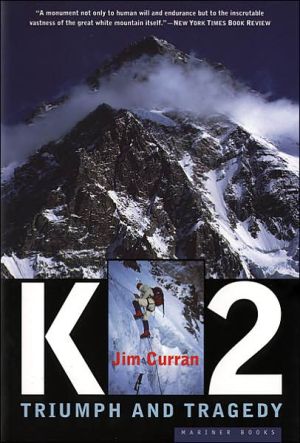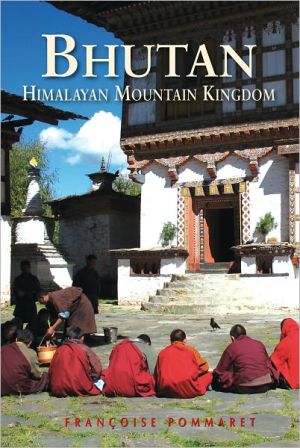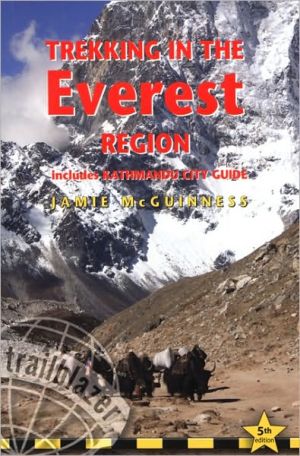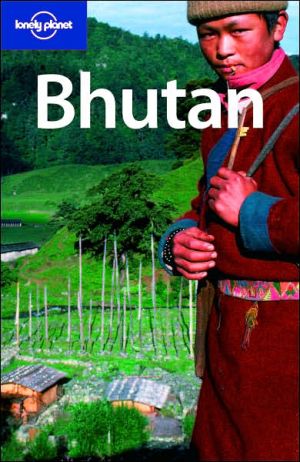Beyond the Sky and the Earth: A Journey into Bhutan
Jamie Zeppa was 24 when she left a stagnant life at home and signed a contract to teach for two years in the Buddhist hermit kingdom of Bhutan. Much more than just a travel memoir, Beyond the Sky and the Earth is the story of her time in a Himalayan village, immersed in Bhutanese culture and the wonders of new and lasting love. Whether you're travelling to Bhutan, looking for the best travel writing around, or wishing to be transported to a culture, mindset, and...
Search in google:
In the tradition of Iron and Silk and Touch the Dragon, Jamie Zeppa’s memoir of her years in Bhutan is the story of a young woman’s self-discovery in a foreign land. It is also the exciting début of a new voice in travel writing.When she left for the Himalayan kingdom of Bhutan in 1988, Zeppa was committing herself to two years of teaching and a daunting new experience. A week on a Caribbean beach had been her only previous trip outside Canada; Bhutan was on the other side of the world, one of the most isolated countries in the world known as the last Shangri-La, where little had changed in centuries and visits by foreigners were restricted. Clinging to her bags full of chocolate, hair conditioner and Immodium, she began the biggest challenge of her life, with no idea she would fall in love with the country and with a Bhutanese man, end up spending nine years in Bhutan, and begin a literary career with her account of this transformative journey.At her first posting in a remote village of eastern Bhutan, she is plunged into an overwhelmingly different culture with squalid Third World conditions and an impossible language. Her house has rats and fleas and she refuses to eat the local food, fearing the rampant deadly infections her overly protective grandfather warned her about. Gradually, however, her fear vanishes. She adjusts, begins to laugh, and is captivated by the pristine mountain scenery and the kind students in her grade 2 class. She also begins to discover for herself the spiritual serenity of Buddhism.A transfer to the government college of Sherubtse, where the housing conditions are comparatively luxurious and the students closer to her own age, gives her a deeper awareness of Bhutan’s challenges: the lack of personal privacy, the pressure to conform, and the political tensions. However, her connection to Bhutan intensifies when she falls in love with a student, Tshewang, and finds herself pregnant. After a brief sojourn in Canada to give birth to her son, Pema Dorji, she marries Tshewang and makes Bhutan her home for another four years. Zeppa’s personal essay about her culture shock on arriving in Bhutan won the 1996 CBC/Saturday Night literary competition and appeared in the magazine. She flew home to accept the prize, where people encouraged her to pursue her writing. Her letters from Bhutan also featured on CBC’s Morningside. The book that grew out of this has been published in Canada and the United States to ecstatic reviews, followed by British, German, Dutch, Italian and Spanish editions. Although cultural differences finally separated Jamie and Tshewang in 1997 while she was writing the book and she returned to Canada, she will always feel at home in Bhutan. Zeppa shares her compelling insights into this land and culture, but Beyond the Sky and the Earth is more than a travel book. With rich, spellbinding prose and bright humour, it describes a personal journey in which Zeppa acquires a deeper understanding of what it means to leave one’s home behind, and undergoes a spiritual transformation. New York Times Book Review ...Zeppa's earnestness and mettle bring freshness to her tale...
\ \ \ \ Chapter One\ \ \ A Remote Posting\ \ \ The doors of the Paro airport are thrown open to the winds. The little building and its single stripe of tarmac are set in the middle of dun-colored fields dotted with mounds of manure. The fields are carved into undulating terraces edged with sun-bleached grass; intricate footpaths lead to large houses, white with dark wooden trim. A young girl in an ankle-length orange-and-yellow dress, two horses, three cows, a crow in a leafless willow tree. An ice-blue river splashing over smooth white stones. A wooden cantilever bridge. Above the bridge, on a promontory, a massive fortress, its thick white walls tapering toward the top, a golden spire flashing on the dark red roof\ All around, the mountains rise and rise, pale gold and brown in the February light. At one end of the valley, beyond a wall of black, broken peaks, one white summit shimmers; at the other end, the mountains grow tamer, softly rounded and turning smoky blue in the distance. On the slopes I can see clusters of prayer flags, long narrow strips of white cloth raised on towering poles, floating in the wind.\ This is what I flew into, leaving behind the cities of India sprawling over hazy plains. At first, the mountains were far below, plunging into narrow valleys thick with forest, dense, impenetrable. "Ladies and gentlemen," the pilot said, "we have now begun our descent into Paro," and the little plane dropped suddenly, leaving me gasping as we skimmed over ridges and dropped again, into one of the few valleys in Bhutan wide and flat enough to land a plane in.\ The sun slips into the crevasse between two hills and the afternoon is over. The line at the visa counter moves slowly. I am the last one at the desk. The visa officer carefully inspects and then stamps my passport. My bags are lying alone on the tarmac outside, beneath furiously snapping flags. I haul them in. I have arrived.\ \ \ On the shelf above the desk in my one-room apartment overlooking a strip mall in the northern suburbs of Toronto, there were two blue plastic trays, one filled with graduate-school application forms, and the other marked simply "other." In the "other" pile was an article entitled "Working Your Way Around Europe," a yellowing passport application form, and a newspaper ad: TEACHERS WANTED FOR OVERSEAS POSTS. It was 1988, I was twenty-three. Outside my one window, winter was melting into sludge. The ad announced positions in southern Africa and central America, but the one that caught my attention was for an English lecturer at a college in the Himalayan kingdom of Bhutan. Two years of teaching and overseas experience were required for the position. I had neither, but I showed the ad to my boyfriend, Robert, who had once been to South America on an international development seminar. "Don't you think it would be a great experience?" I asked.\ "It does look good on a résumé," he said. But I hadn't meant that kind of experience. I wanted something outside of professional considerations and career connections, something that wouldn't fit on a CV. Robert and I had decided to get married but that would be several years in the future, when we were both finished with our studies. I was supposed to be starting a Ph.D. in English. But I kept wondering if I should do something else altogether. I want to do something in the real world, I kept saying to Robert—to which I would invariably add, "whatever that means." It wasn't that my life felt unreal to me, it just seemed very ... small. I was tired of reading theory and writing essays, and, except for a week on a beach in Cuba, I had never been anywhere.\ A few days later in the library, I remembered the ad and looked up Bhutan. There were four or five books, thick-paged volumes with washed-out black-and-white photos, all published in the 1960s and early '70s. I took notes in the back of my journal: Bhutan, small Tantric Buddhist Kingdom in the Eastern Himalayas. Bordered by Tibet in the north, India in the south and east, Sikkim to the west. Entirely mountainous (altitudes ranging from 150 to 7,000 meters above sea level). Capital." Thimphu. Language: Dzongkha, related to classical Tibetan, plus various other dialects. People: in north and west, of Tibetan origin," in the east, Indo-Mongolian; in the south, Nepali. National sport: archery. Government: hereditary monarchy, established 1907, replacing dual system of government with religious and secular heads. Closed to outside world for centuries. Never colonized.\ Modern economic development had begun in Bhutan in the 1960s with the construction of a road linking Thimphu to the Indian border. Until then, the economy had been based on barter; money was virtually nonexistent, and taxes had been paid in kind. Thirty years later, the feudal nature of rural Bhutanese society seemed largely unchanged. Virtually everyone owned land, but, except for the lowlands along the southern border, the terrain was too difficult to permit much more than subsistence farming. Buddhism permeated daily life, and many families still sent one son into the monastery. Relatively few foreigners visited the country; foreign aid was limited, and tourism discouraged.\ I skimmed snippets of a British emissary's journey through Bhutan in 1774, and then studied pictures taken in the 1970s. Two hundred years had not made much apparent difference. The photographs showed mostly mountains, darkly forested, a few stone and wood houses planted along the edges of cultivated fields. It was like the Brothers Grimm. Bramble fences, stone walls, a woodcutter, a haystack. Fortresses on hillsides, overlooking narrow river valleys. An old man in a dark knee-length robe standing in a flagstone courtyard. A woman leading a small, stout horse, two young children following, bent under backloads of sticks. A boy waving a switch at a herd of cows. A barefoot, bareheaded king.\ The deadlines for various graduate schools got closer, and the jumble of applications grew larger. I kept thinking of those pictures that were like certain poems that leave a little hole somewhere inside you. I called the World University Service of Canada, the agency which had placed the ad, and asked for an application form for the posting in Bhutan.\ "Where the hell is that?" my grandfather asked when I told him on my next visit to Sault Ste. Marie, the northern Ontario steel town where I had grown up. My parents had split up when I was two, and in the ensuing turbulence, my father's parents had ended up with custody of my brother and me. They had been caring guardians but overly protective, especially my grandfather. My grandmother had died of cancer the year before, and my grandfather, feeling his seventy-two years, was anxious to see my brother and me settled in our lives.\ "What do you want to go Over There for?" he said.\ The rest of the world was all one place to him. If you weren't here, you were Over There.\ "It's the same Over There as it is here," he said, and then promptly contradicted himself by asking what was I, crazy, did I want to get myself killed or something?\ I told him that I would be going Over There with a legitimate, government-funded agency that had a long history of placing volunteers around the world, so there was no need to worry.\ He named several causes for worry. What if I got sick? What if I had a terrible accident? What if there was an earthquake, a flood, an epidemic, a war? What if, what if. He came up with a hundred stories of people who went off and never came back, dead of unnamed diseases, lost in jungles, swept away by rivers, fallen off mountains, fallen in love, never heard from again. I should have known; I had been raised on tales of worry and what if. "Don't take chances. Life is too short to live by your own experiences," my grandfather had told us countless times. "Learn from other people's mistakes."\ "What about school?" he said. "What about your Ph.D.?" The Depression had cut short his own education before he reached high school, and the value of education was one of his favorite subjects—"education" meaning knowledge that could be practically applied to save you from a lifetime in the coke ovens. I could see what he foresaw for me—the future opening up, the path leading over a low rise just ahead into an assured future, a secure career, a good marriage. He wouldn't understand if I told him that my future seemed to be closing in, getting smaller and narrower and more rigidly fixed with each essay I completed.\ He had spent his whole life making his world safer, smaller, more secure. The basement pantry was lined with tins of food we would never eat, he saved bottles, nails, envelopes, old wrapping paper, broken toasters, bits of wire, cloth and carpet. "You never know when you'll need it," he said. Caution was his religion: you never know, you can't be too careful, better safe than sorry. In his experience, change meant loss. His own parents had immigrated from Poland, making the dark, cold journey across the Atlantic, moving up through New York, Pennsylvania and Michigan, into Ontario. They settled in Sault Ste. Marie, in the shadow of Algoma Steel, but even after the Depression, when things got better, they were not at home in this harsh new unfinished world, this Canada, and talked longingly of Poland, in Polish, until they died. This is what happened when you uprooted yourself, my grandfather believed: you could not go back and yet you did not belong. He believed in staying put.\ I sat in my old bedroom, looking out the small window at the steel plant, with its wire fences, enormous grids and towers, smoke stacks staining the sky all year round. We had grown up chanting the names of the mysterious places inside—coke ovens, coal docks, blast furnace, slag dump. We knew you could grow up and get a job there, make good money working three-to-eleven, eleven-to-seven. "Your father could have been making good money there now," my grandfather said, shaking his head. "Would have made something of himself by now." When my father went to Toronto after the divorce, we were in awe. If you grew up in Sault Ste. Marie, Toronto was the ultimate destiny. If you got all the way to Toronto, you did not have to come back. My mother was proof of this; after the divorce she had only gone to Europe, and then she had come back. We did not consider that she wanted to be close to her children, we thought she had just not gone far enough away. My father returned only for brief visits, his long hair falling down the back of his black silk shin, hundred-dollar bills folded in half and clipped in his pocket. "Your father seems to have done well for himself in Toronto," people said, their admiration ending in a question mark. "He's in the music industry," my brother and I learned to say, "he's a promoter," but my grandfather was not impressed. "Working in goddamn barrooms. Would have been foreman by now." Toronto meant nothing to my grandfather, and he would not allow us to visit there when we were children. Traveling was something you did because you had to—if you got a job in another city, a real job, not in the music industry, but, say, as a dentist, my grandfather's dream profession—"Look at the Miller boy," he kept saying, "he's making money hand over fist." Traveling was not something you did for fun or experience or love. "Waste of money, that's all it is," my grandfather said. It had taken quite a bit of work just to convince him to allow me to leave home to go to university, first in Ottawa and later in Toronto. And now I wanted to go to the Third World. The Third Word! It was preposterous! It was for the birds!\ "And what about Robert?" my grandfather demanded. "I thought you were getting married. What does Robert have to say about all of this?" My grandfather liked Robert: he was smart and dependable. I had met him at university. My grandfather said Robert was blue-chip stock.\ "I'm coming back, Grandpa. And Robert thinks it'll be a great experience." I didn't say that Robert's initial enthusiasm was declining now that I'd actually applied. "I've never been anywhere," I said. "This may be the only chance I'll ever get to do something like this."\ "I've never been anywhere either and it hasn't hurt me," he said. "It's just plain foolishness. Don't take chances. Prepare for your future and forget about going Over There."\ "Well, I've only applied. Maybe I won't be accepted," I said, hoping to erase the fret lines from between his eyes, if only temporarily. I hated to worry and disappoint him but I could not lie outright and promise not to go.\ The World University Service of Canada (WUSC) called me for an interview. The two interviewers, neither of whom had been to Bhutan, gave a short introduction to the program there. When secular education began in the country thirty years ago, with the help of a Canadian Jesuit named Father Mackey, the Bhutanese government chose English as the medium of instruction. On Bhutan's northern border, Tibet had been annexed by China and the world had not even blinked. Bhutan did not want to suffer a similar fate; it was time to end its policy of official isolation and enter the modern world. The Royal Government proceeded cautiously, however, and the pace of development was kept deliberately slow. The education system, still in its early stages, was suffering from a severe shortage of teaching staff, which made it necessary to recruit foreign teachers. Although the vast majority came from neighboring India, there were about seventy teachers from volunteer agencies such as WUSC and the British organization VSO at schools and institutes throughout the country. WUSC had a total of fifteen Canadian teachers there, all placed in eastern Bhutan, where Father Mackey had helped start the first English-medium schools in the 1960s. These teachers were provided with accommodations and paid local salaries. Work terms were for two years, although teachers could and often did extend their contracts.\ Conditions were very basic, sometimes in fact quite difficult, the interviewers said. Life at the college posting for which I had applied was a bit more comfortable, but it was by no means luxurious. There were few roads in Bhutan, and most of them would be closed during the heavy summer rain and the winter snow. There would be other Canadians, yes, but I would be several hours away from most of them. Basically, I would be cut off, immersed—how did I feel about that? How would I fill up my time? Did I have a boyfriend? How did he feel about my decision to leave him for two years? Did I realize that there were no phones in the eastern part of Bhutan? That most Bhutanese lived in villages and hamlets dotted across one of the most difficult terrains in the world? They proposed several situations—a serious argument with the principal, discipline problems in class, illness, cultural misunderstandings, an accident: what would I do? I constructed answers as best I could, trying to sound sensible and good-humored, ignoring the voice in my head that kept asking, "But what would you really do?"\ Afterward, I went back to the library and flipped through the books again, studying the pictures, trying to place myself in them. I had a strange feeling in the pit of my stomach, like I was standing at the edge of a cliff.\ \ \ The letter of acceptance from WUSC came in September of 1988, along with a Briefing Kit, a spiral-bound book of information on travel, health concerns, culture shock, and a list of things I should bring. I shoved my incomplete applications to Ph.D. programs into a file folder, restored several tomes of literary criticism to the university library and turned my attention to the list. The List! I could recite it in my sleep. I returned from daily excursions to hardware stores, sports stores, electronics stores, drug stores, grocery stores, mountain-equipment stores and the Tropical Diseases Institute, to count and organize items on the bedroom floor. There were piles of Warm Clothing (thermal underwear, flannel shirts in dark colors—winters would be cold, the Briefing Kit said, and the houses would be unheated); Medicines (Gravol, antibiotics, delousing shampoo); Equipment (handheld water filter, Swiss Army knife, assorted tiny tools, $50 high-tech flashlight with a five-year warranty); Other Useful Items (vegetarian cookbook, plastic containers with lids, Ziploc bags, lighters, packets of dried food).\ Robert stood in the middle of the room, staring at the piles. "Surely you don't have to take all this," he said.\ "I do," I said, stuffing woolen socks, tampons, and The Norton Anthology of English Literature into a hockey bag. "It's like preparing for a two-year camping trip."\ "It looks more like you're preparing for a natural disaster. What kind of place are they sending you?" he asked, reading the instructions on the delousing shampoo.\ "It's a remote posting, Robert."\ "Well, maybe it's too remote," he said. "After all, you haven't really been anywhere before. Couldn't they send you to an easier posting? What about—"\ I put my hands over my ears. "I don't want to hear it, Robert," I said. "I am going to Bhutan." I was suddenly overwhelmed by a desire not to go.\ Robert spoke my fears aloud. "It's just so far away, and for so long. Two years—I won't even be able to phone you."\ "You could apply too," I said. "We could go together." We had talked about this possibility before, but I knew that Robert had other plans for his life now. He had been a professional musician before I met him, but it hadn't paid off, and he'd given it up to return to university. It had been a sad and troublesome choice, to give up the thing he loved best, the music in his head, in order to have something more tangible, a degree in his hand, a guaranteed job in teaching or administration. My grandfather wholly approved, but secretly, I sympathized with the part of Robert that missed his music. He was rebuilding now, he said, putting the pieces in place, he wanted to have something when he finished. This was not a time to go anywhere.\ I could call up the office in Ottawa, I thought, and tell them I can't go. I could cite personal reasons. I could still apply to graduate school. I could take a year to think about it:. Two years was a long time to be apart—I should think about it. But I knew that if I didn't go now, I never would. And lots of people had relationships over long distances, I told myself. We knew several couples who had survived long separations.\ I went back to the List. I would take my portable keyboard and lots of batteries, and books I'd alway wanted to read: a collection of Buddhist readings, Lost Horizon, the Tibetan Book of the Dead. I selected photos of Robert, my family and friends, a few postcards to stick on the walls of my new home, a miniature blue teacup I'd had since I was a child. My luggage grew heavier; I bought another hockey bag. This comforted me. I wasn't going out there with nothing. In between the shopping and packing, I argued endlessly with my grandfather on the phone. We debated travel v. academic qualifications, the first world v. the third world, challenge v. goddamn stupidity, the chances of contracting dengue fever on the other side of the planet v. the chances of being run down by a milk truck outside one's childhood home, for the experience v. for the birds. Another letter came, fixing the departure date for February 16, 1989, several weeks away. I called my friends to say this is it, yes, I am going, goodbye.\ A few days later, I got a phone call from the head office in Ottawa. The principal of the college in Bhutan, a Canadian Jesuit, had rejected my application. He wanted someone older, with more experience. Apparently, he was uncomfortable with the fact that I would be the same age as some of the students. The man on the phone was very sorry, but ...\ But nothing! I thought. I'm packed, I'm ready, I am going. I said, "I'm all ready to go."\ The voice said yes, but ... and I said yes, but ... and this went on for several minutes until he asked if I would be willing to teach in a junior high school. Junior high meaning grades one through eight. In a more remote posting. There was still one position open, although it was, uh, quite different from the one I'd applied for. There was no electricity, for one thing.\ "Yes, fine, grade eight in a more remote posting," I said.\ "Well, you'll probably be assigned to grade two."\ "Fine, fine," I said. Grade two in a more remote posting. Kindergarten on the Tibetan border. I didn't care. I was going.\ "Jesus Christ, Jamie Lynne! I hope you know what the hell you're getting yourself into," my grandfather kept saying.\ I said I knew. I had been to the library, I said, I had looked things up. I had seen the maps. I knew how far away I was going.\ In truth, I had no idea.\ People kept asking why I was going, and I gave the entire range of possible answers. For the experience, I said. I've never been anywhere. I'm tired of school. I want to learn about development, the Himalayas, Buddhism. I want to do something different. I want to travel. I don't want to be a tourist. It sounds fascinating. I don't know. I knew I seemed a fairly unlikely candidate for an adventure into the unknown. And secretly I doubted that I had what it took, whatever it took, to head off alone to a country most people had never heard of. In light of this, my determination to go puzzled me. It was more than just growing up under the smoke stacks, dreaming the small-town dream of escape like my parents before me. And it was more than feeling that I was going to wake up one morning soon trapped in my future. For all my years of study, I wasn't sure I had actually learned anything. I had gained intellectual skills and tools, yes, but what did I know? I wanted to throw myself into an experience that was too big for me and learn in a way that cost me something.\ I spent my last night in Canada with Robert, trying to forget that I was leaving the next day. I held his hand tightly long after he had fallen asleep, the names running through my head—Paro, Thimphu, Pema Gatshel, Bhutan Bhutan Bhutan.\ He took me to the airport in the morning. We held hands, we kissed goodbye. It was only two years, we told each other, and we would be together again at Christmas. We would write. It wouldn't be easy but we would stay connected, because we loved each other, because we wanted to get married, because I was coming back. But on the other side of the security check, I sat and cried. I loved Robert. I didn't know why on earth I was leaving him.
\ From Barnes & NobleBarnes & Noble Discover Great New Writers\ At age 22 Jamie Zeppa, a Canadian who had never been outside of North America, said goodbye to her fiancé and her plans for graduate school and moved to Bhutan, a remote Buddhist kingdom in the Himalayas. \ Beyond the Sky and the Earth is an autobiographical work that details her experiences and transformations after spending three years in Bhutan. It is as much a book about Zeppa's day-to-day life in Bhutan as it is about the personal awakenings and realizations that she had while living there.\ Visitors to Bhutan, an increasingly hot tourist destination, are still few and far between, largely because of tight government restrictions on entry, visa requirements, and a law requiring tourists to spend at least $200 a day there. There aren't many books on Bhutan, and even fewer firsthand accounts of life there. Beyond the Sky and the Earth stands out as both an informative introduction to the people and culture of Bhutan and as a beautiful piece of travel literature set against the backdrop of one of the most remote and unspoiled places on earth.\ Zeppa recounts her experiences living abroad — like learning to live without electricity and carrying on a forbidden affair with one of her students — in such a compelling way that even someone who has never left home will become entranced by her story and captivated by her unique experiences.\ Naturally, Zeppa experienced culture shock when she arrived in Bhutan. The hardships she encountered seemed insurmountable, and at first she thought she couldn't bear it and fantasized about returning toCanada.She had to learn a new language in order to communicate with her students, she had to learn to live on her own, and she had to learn to deal with homesickness. Perhaps her biggest challenge was learning how to reconcile her growing love for Bhutan with her nostalgia for her life in Canada, her family, and her fiancé.\ But after living among Bhutan's Himalayan peaks, lush valleys, colorful villages, and friendly people, and after gaining an appreciation for life in a place frozen in time, Zeppa realizes that she feels at home in Bhutan and wants to stay.\ Although to Zeppa Bhutan is a magical land, she cautions herself and the reader not to deem it "the last Shangri-La," as is often done by the lucky travelers who make their way through the red tape required for entry into the kingdom. Bhutan is not without its problems: It is an underdeveloped country plagued by the problems that affect many places cut off from modernity. There is infant mortality, illness, and poverty. There are also domestic and international tensions that stem from the government's stringent regulations intended to preserve the national culture. Among them are the prohibition of foreign television and a requirement that people wear the national dress, a kira for women and a gho for men.\ Few of us will ever get to see the place that was Zeppa's home. But her narrative is so clear and insightful that you easily feel as though you are sharing this portion of her life with her. Even if you haven't had the experience of living abroad, or if the prospect of a trip to the furthest reaches of Asia is not in your cards, Zeppa's book is a worthy read on many levels.\ From her powerful use of language to describe the superb beauty of Bhutan's landscape to her passionate description of her spellbinding relationship with her future husband, Beyond the Sky and the Earth draws readers in and takes them on her rocky ride to self-realization.\ When trying to explain to a friend what she finds appealing about Bhutan, Zeppa writes: "It takes a long time to find the true words, to put them in order, to tell the whole story. It is not just this or that, the mountains, the people, it is me and the way I can be here, the freedom to walk unafraid into the great dark night. It is a hundred thousand things and I could never trace or tell all the connections and reflections, the shadows and echoes and secret relations between them."\ But, in fact, Zeppa does tell the reader about these connections and reflections in a lyrical way. After reading the book, you will have a deep understanding, appreciation, and respect for Zeppa's strength of character and for the wonders of Bhutan.\ Beyond the Sky and the Earth is a delight to read in every way. Zeppa's beautiful prose, peppered alternately with funny observations and profound soul-searching, is a truly special and unique work that will leave you craving an adventure of your own.\ \ \ \ \ \ New York Times Book Review...Zeppa's earnestness and mettle bring freshness to her tale...\ \ \ Publishers WeeklyZeppa's story is nearly an inversion of the ancient Buddhist tale of Siddhartha in which a prince ventures from the paradise of his father's palace only to find the suffering and decay that he never knew existed in that the author, at the age of 22, abruptly leaves a stale life in Canada to become a volunteer teacher in the remote and largely undisturbed Buddhist kingdom of Bhutan. Cloaked in the airy mountains between India and China, Bhutan initially frustrates but eventually captivates Zeppa with its rudimentary lifestyle that forces her to question former values and plans for the future. Though the story line would seem to open itself to cloying romanticization, Zeppa's telling of her clumsy attempts to adapt rings with sincerity and inspires sympathy. She thinks to herself upon visiting a local house: "In one shadowy corner, there is a skinny chicken. I blink several times but it does not vanish. Is it a pet? Is it dinner?" Zeppa's lucid descriptions of the craggy terrain and honest respect for the daily struggles of the natives bring the tiny land to life in a way that is reverent but real. Though she tries to avoid what a friend terms "that Shangri-La-Di-Da business" and grapples with the poverty, sexism and political squabbles in Bhutan that bother her, there is little doubt that she sees the place in a largely positive light and is tempted to remain. In the end, Zeppa's is a lively tale of her earnest efforts to reconcile what she has learned with what she has known. June Copyright 1999 Cahners Business Information.\ \ \ \ \ Library JournalCanadian Zeppa turned away from a secure future "to do something in the real world." When the opportunity came to teach in the remote Buddhist kingdom of Bhutan, Zeppa accepted with alacrity over the protests of her xenophobic grandfather and the lukewarm approval of her fianc . At 22, Zeppa was unprepared for the rigors of life in the Third World. Upon arrival at her assigned junior high school in the tiny tropical village of Pema Gatshel, she was dismayed by the primitive living quarters and her own inadequacies as a teacher. But her overwhelming culture shock was eased by the charm of the Bhutanese and the beauty of the landscape. Leaving her first assignment with reluctance, Zeppa was transferred to a position at a college in the mountain town of Kanglung, became a Buddhist, and plunged into a relationship with one of her students. Her story reads like a good novel; even her youthful na vet has charm. Zeppa's deep affection for her adopted home makes this a special book. Highly recommended.--Janet N. Ross, Washoe Cty. Lib. Sys., Sparks, NV Copyright 1999 Cahners Business Information.\ \ \ \ \ Tricycle MagazineAdmit it: You wish you could travel to the remote Himalayas, meet Buddhist teachers, and be romanced by a handsome young Bhutanese man. Well, Zeppa beat you to it.\ \ \ \ \ NY Times Book Review...Zeppa's earnestness and mettle bring freshness to her tale...\ \ \ \ \ New York Times Book ReviewZeppa's book suggests what other contemporary travel books do not: that there are still a few places left in the world so strange and wondrous that a journey there has the power to transform the traveler, even against her will.\ \ \ \ \ MademoiselleReading the early pages of this rich, romantic, lushly descriptive memoir of Zeppa's three years in the tiny Buddhist kingdom just south of Tibet, I counted my cushy American blessings....But by the end, I not only got why Zeppa stayed in Bhutan...I actually envied her experience. Her tale is part love story, part history lesson and part Buddhism 101....Zeppa writes romantically without romanticizing, and her fascinating story is something you'll marvel at the first time and want to go back to again and again.\ \ \ \ \ Harpers BazaarHeartfelt...a good reminder that your passport, both literally and figuratively, can open up an entire world of possibilities.\ \ \ \ \ Chicago TribuneA joy to read.\ \ \ \ \ Kirkus ReviewsA coming-of-age memoir by a young Canadian woman with a literary bent whose three-year sojourn in a Buddhist kingdom in the Himalayas challenged her values, changed her religion, and altered her life's course. In 1988, Zeppa, a graduate student hungry for experience and uncertain about her future, took a two-year teaching job offered by the World University Service of Canada that sent her to eastern Bhutan. The shock of isolation and privation was at first overwhelming, but Zeppa soon fell in love with her new world. Initially posted to the tiny, remote village of Pema Gatshel to teach young children, she was transferred several months later to the campus of Sherubtse College, where her students were closer to her own age and where living conditions were somewhat less primitive. It is here that her idyllic view of the Bhutanese undergoes some refinement. She becomes uncomfortably aware of the country's political problems, of the lack of personal privacy, and of the extreme pressure for social conformity. Still enthralled by the beauty of Bhutan's pristine mountain setting and in love with Tshewang, a Bhutanese student (she and her Canadian fiancé having long since parted company), Zeppa stays on for a third year. While the early portion of her story is delightful—her enthusiasm for Bhutan and its people is infectious and her descriptions of her encounters with Bhutanese culture are often funny and always enlightening— her account of her relationship with her Bhutanese lover falls flat. The ending seems rushed and unfinished. Her pregnancy and subsequent return to Canada, where her son Pema Dorji is born, her return to Bhutan, her marriage to Tshewang there in 1993, andher return to Canada—all this is compressed into a few pages. An uneven account with many perceptive, lyrical passages.\ \
